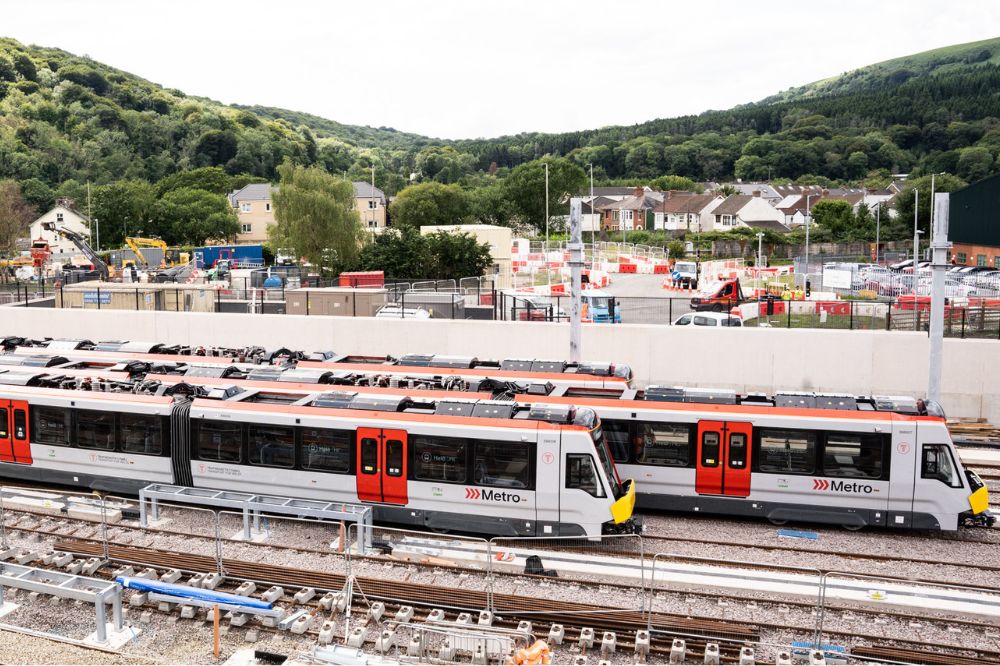Architect of South Wales Metro publishes book telling backstory of project

Emily Price
The principal architect behind the South Wales Metro has published a book revealing the backstory to the £1bn rail scheme.
Written by Prof Mark Barry, ‘How to build a Metro’ gives an unparalleled insight into the project as well as a 15-year forward look at the future of other Welsh metro schemes.
Former First Minister Carwyn Jones formally launched plans for the integrated public transport service involving trains, trams and buses at Pontypridd station in 2015.
Since August 2020, Transport for Wales has undertaken major engineering and infrastructure work across Core Valley Lines in readiness to introduce 36 brand new Class 398 tram-trains which will run on 170km of electrified track.
Final stage
The project includes a new depot at Taff’s Well and renovations at 40 stations as well as new platforms and bridges.
The South Wales Metro is now in its final stages of construction and is expected to be completed by late 2025 or early 2026.
Once tram-trains launch, an upgraded timetable will see journey times reduced and capacity and frequency doubled.
It’s been 15 years since Mark first set out his ideas for a Cardiff Capital Region Metro and just over 13 since his report, ‘A Metro for Wales Capital City Region’ was published with the Cardiff Business Partnership and Institute of Welsh Affairs.
The Professor of Practice in Connectivity at Cardiff University was previously an advisor to the Welsh Government and Transport for Wales.
His new book tells the story of the collective effort behind the Metro, and includes a call to arms for less car use, the need for transport orientated development across Wales and further devolution and transport funding.
Mode shift
Mark says the current South Wales Metro programme provides a foundation for further expansion in order to fulfil Wales’ Net Zero Wales obligations which require a major mode shift to public transport by 2040.
He said: “I have spent the last 3 years documenting my journey from 2009 through to October 2024; how I saw the Metro, from its background and regional context, through advocacy and building political support, right up to Transport for Wales actually building and soon to be operating a Metro.
“I also set out some of my key learnings on the way: in transport planning, transit-oriented development and our need to reduce car dependency.
“I also touch upon the dysfunction of the UK rail industry ecosystem vis a vis Wales and equity and lack thereof, in rail enhancement funding by UK Government over decades.
“This Welsh Government led (and Transport for Wales delivered) project is even more remarkable given it is in a ‘non-devolved’ area.
“Rail infrastructure in Wales is still the responsibility of the UK Government at Westminster. I also set out what we still need to do up to 2040 and beyond.
Commitment
He added: “This book is one history of the development and advocacy of the Metro project, and I know there will be many others who may have different views and recollections.
“Nonetheless I wanted to make my story available to those with an interest in how big projects happen in Wales and probably other places.
“I think the book may also be of use to people and organisations in other places that need a Metro.
“Aside from Welsh Government and Transport for Wales, many people will need a pat on the back for their efforts and commitment for delivering perhaps Wales’s most important transport project since the establishment of a Welsh Government in the late 1990s.
“So, I have also tried to name as many as possible of those I interacted with over the last 15 years – it’s over 400 people already – to acknowledge the huge collective effort required to realise my original idea.”
You can read Mark’s new book online here.
Support our Nation today
For the price of a cup of coffee a month you can help us create an independent, not-for-profit, national news service for the people of Wales, by the people of Wales.






My main concern is the lack of a decent bus service in Cardiff. Trains are ok but most locals need buses to get to work leisure etc. Almost impossible today in Cardiff, Cardiff Bus is expensive, unreliable and infrequent. Surely building an expensive metro is putting the cart before the horse.
With tram-trains, many of those bus routes can be replaced by more reliable tram routes. Instead of putting the cart before the horse, this replaces the horse with an electric motor. Much better.
When? In 20 years? Where are you going to put tram lines, and when? We need a solution now, not in some distant future.
Ever had the feeling plans are made by and for those with decades in front of them…
Slow moving tram built one tiny piece at a time. Ready for 2050, if you are lucky.
These things will take years, run late and over buget. By that time the majority of people here will be pensioners, those on benefits and the bloated public service. We will be broke and even poorer than now
There are many inadequacies in bus provision in Cymru, Linda Jones. No doubt their operation and management could be improved. But the main problem is that they are expected to fulfil a number of roles, some which they do not do well. They add to congestion at peak times, for example, but are also excellent rail and tram feeders. The answer lies in an intermediate mode – true on-street light rail – NOT the heavy tram-trains of the Metro or the trams of Manchester. Stuttgart, which operates both, showed that light rail is cheaper over 35y than bus. LIGHT rail… Read more »
This Welsh Gov led project is even more remarkable given it is in a ‘non-devolved’ area…interesting statement…